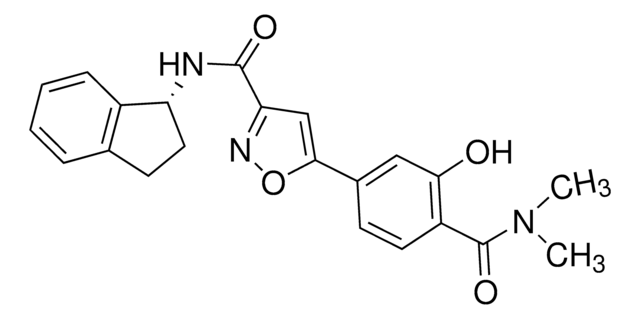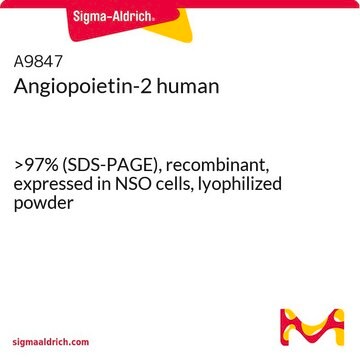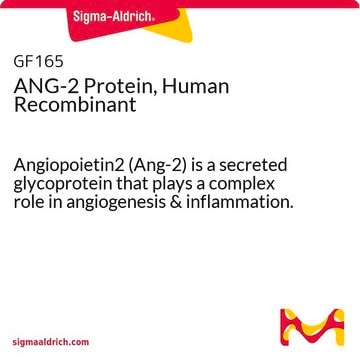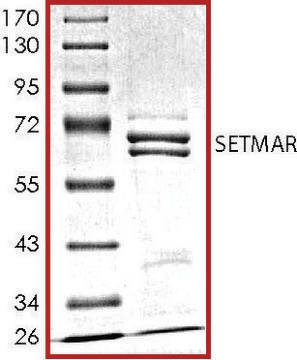추천 제품
생물학적 소스
human
재조합
expressed in HeLa cells
분석
≥95% (HPLC)
≥95% (SDS-PAGE)
형태
lyophilized
분자량
60.0-70.0 kDa
포장
pkg of 5 μg
기술
cell culture | mammalian: suitable
불순물
<0.1 EU/μg endotoxin, tested
색상
white to off-white
UniProt 수납 번호
배송 상태
wet ice
저장 온도
−20°C
유전자 정보
human ... ANGPT1(284)
관련 카테고리
일반 설명
Angiopoietin-1 (Ang-1) is a secreted ligand for Tie-2, a tyrosine-kinase receptor expressed primarily on vascular endothelial cells and early hematopoietic cells. The gene encoding this protein is localized on human chromosome 8q23.1. Recombinant human ANG-1, derived from HeLa cells, is a C-terminal histidine tagged glycoprotein which migrates with an apparent molecular mass of 60.0-70.0kDa by SDS-PAGE under reducing conditions. Sequencing analysis shows N-terminal sequences starting with Ser-20 and with Asp-70 of the 498 amino acid precursor protein.
생화학적/생리학적 작용
Ang-1/Tie-2 signaling promotes angiogenesis during the development, remodeling, and repair of the vascular system. Transgenic mice lacking expression of either Ang-1 or Tie-2 fail to develop a fully functional cardiovascular system and die before birth. Postnatally, the angiogenic activity of Ang-1/Tie-2 is required during normal tissue repair and remodeling of the female endometrium in the menstrual cycle. Ang-1/Tie-2 signaling appears to be regulated by Angiopoietin-2 (Ang-2), a natural antagonist for Tie-2 that exerts its effects through an internal autocrine loop mechanism. In addition to suppressing endothelial cell activation by inhibiting the expression of adhesion and inflammatory molecules, Ang-1 enhances endothelial cell survival and capillary morphogenesis, and lessens capillary permeability. As such, Ang-1 has a potential to become an effective therapeutic agent for treating various endothelium disorders, including several severe human pulmonary diseases. The efficacy of cell-based Ang-1 gene therapy for acute lung injury (ALI) has recently been studied in a rat model of ALI. The results of this study show that such therapy can markedly improve lung condition and suggest that Ang-1 therapy may represent a potential new strategy for the treatment and/or prevention of acute respiratory distress injury (ARDI), a significant cause of morbidity and mortality in critically ill patients.
서열
MSNQRRSPEN SGRRYNRIQH GQCAYTFILP EHDGNCREST TDQYNTNALQ RDAPHVEPDF SSQKLQHLEH MENYTQWLQ KLENYIVENM KSEMAQIQQN AVQNHTATML EIGTSLLSQT AEQTRKLTDV ETQVLNQTSR LEIQLLENSL STYKLEKQLL QQTNEILKIH EKNSLLEHKI LEMEGKHKEE LDTLKEEKEN LQGLVTRQTY IIQELEKQLN RATTNNSVLQ KQQLELMDTV HNLVNLCTKE GVLLKGGKRE EEKPFRDCAD VYQAGFNKSG IYTIYINNMP EPKKVFCNMD VNGGGWTVIQ HREDGSLDFQ RGWKEYKMGF GNPSGEYWLG NEFIFAITSQ RQYMLRIELM DWEGNRAYSQ YDRFHIGNEK QNYRLYLKGH TGTAGKQSSL ILHGADFSTK DADNDNCMCK CALMLTGGWW FDACGPSNLN GMFYTAGQNH GKLNGIKWHY FKGPSYSLRS TTMMIRPLDF
물리적 형태
Lyophilized from 20mM Sodium Phosphate, pH 7.5 + 200mM NaCl + 5% Trehalose.
재구성
Centrifuge the vial prior to opening. Reconstitute in water to a concentration of 1.0 mg/ml. Do not vortex. This solution can be stored at 2-8°C for up to 1 week. For extended storage, it is recommended to further dilute in a buffer containing a carrier protein (example 0.1% BSA) and store in working aliquots at -20°C to -80°C.
Storage Class Code
13 - Non Combustible Solids
WGK
WGK 3
Flash Point (°F)
Not applicable
Flash Point (°C)
Not applicable
시험 성적서(COA)
제품의 로트/배치 번호를 입력하여 시험 성적서(COA)을 검색하십시오. 로트 및 배치 번호는 제품 라벨에 있는 ‘로트’ 또는 ‘배치’라는 용어 뒤에서 찾을 수 있습니다.
Receptor tyrosine kinase-mediated angiogenesis.
Jeltsch M
Cold Spring Harbor Perspectives in Biology, 5(9), a009183-a009183 (2013)
Stelios Tsigkos et al.
Expert opinion on investigational drugs, 12(6), 933-941 (2003-06-05)
The angiopoietin (Ang) family of growth factors includes four members, all of which bind to the endothelial receptor tyrosine kinase Tie2. Two of the Angs, Ang-1 and Ang-4, activate the Tie2 receptor, whereas Ang-2 and Ang-3 inhibit Ang-1-induced Tie2 phosphorylation.
Angiopoietin correlates with glomerular capillary loss in anti-glomerular basement membrane glomerulonephritis.
Yuan HT
Kidney International, 61(6), 2078-2089 (2002)
S Davis et al.
Cell, 87(7), 1161-1169 (1996-12-27)
TIE2 is a receptor-like tyrosine kinase expressed almost exclusively in endothelial cells and early hemopoietic cells and required for the normal development of vascular structures during embryogenesis. We report the identification of a secreted ligand for TIE2, termed Angiopoietin-1, using
Angiopoietin-1 Protects Spinal Cord Ischemia and Reperfusion Injury by Inhibiting Autophagy in Rats.
Jian Yin et al.
Neurochemical research, 44(12), 2746-2754 (2019-10-21)
Spinal cord ischemia and reperfusion (SCIR) injury can induce autophagy, which is involved in the survival of neurons. However, whether autophagy plays a neuroprotective or a detrimental role in SCIR injury remains controversial. Angiopoietin-1 (Ang-1), an endothelial growth factor, has
자사의 과학자팀은 생명 과학, 재료 과학, 화학 합성, 크로마토그래피, 분석 및 기타 많은 영역을 포함한 모든 과학 분야에 경험이 있습니다..
고객지원팀으로 연락바랍니다.








